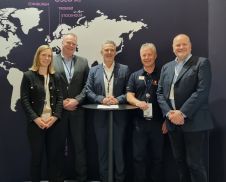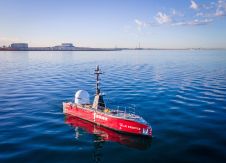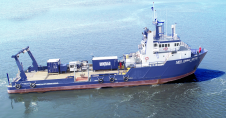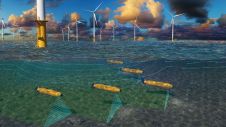"Probably, Possibly, Maybe...?"
The current skill shortage that is causing concern to many in the hydrographic industry is not an isolated case. The same issues are causing major problems in skilled operations for the entire offshore workforce. With the average age of the sector being 55+, there is an acute shortage of the necessary 'manpower' needed to keep the industry going in the future. The author of this article has endeavoured to research this 'case' with particular reference to engineering. In so doing, she has found that this is an 'industry-wide' crisis. Here she identifies those factors that in her experience have led to the current youth culture turning away and seeks to make positive suggestions as to how the industry as a whole may solve their dilemma.
A good friend of mine from the industry once told me that the three words of the title to this article, 'Probably, Possibly, Maybe...?') were the most important skills acquired by a good geophysicist. He said that art of being able to be professionally imprecise while at the same time maintaining and speaking with considerable authority was the golden standard to which each of the 'best' tried to aspire. This of course is urban myth - or should I say, sailing folklore. Having worked myself for a short time closely with many geophysicists and surveyors, I have found them to be the most consummate professionals, taking considerable responsibility and pride within their professional sphere. Thus the whimsical vagueness referred to by many is merely a light-hearted reflection, a trait of the humour and the camaraderie that pervades the profession.
However, this once charming band of individuals is currently confronting a challenge faced by many professional groups associated with the offshore sector, a problem so great that it might indeed threaten the productivity of the offshore sector for the foreseeable future. Many of the presently employed fit into the statistical norm for the offshore sector; white, Anglo-Saxon, male and over 55 years of age. The crisis to which I allude is that of recruitment and retention, a problem familiar to me from much personal experience and now concerning many forward-thinking people. It is already causing huge ripples in other parts of the industry. Nobody seems to want to do it anymore, and even if they did, where would they train?
Research
I have just completed doctoral research into a specific case study of the industrial dilemma. For two years I have examined the issues surrounding recruitment and retention of female engineers in the offshore oil and gas sector. This study resulted directly from seventeen years of teaching 11 - 18 year olds engineering-related activities, followed by a further two running a project with a specific regional brief to recruit young people to these activities. I am well aware of the whys and wherefores and the reasons young people are no longer looking for careers in these fields and, more importantly, what must be done now to proactively change this course of events.
We all see our own sector as being a 'standalone' body. The offshore is more than oil and gas (of course, there are telecommunications, ecological and military interests, to name but a few); engineers see themselves apart from surveyors; surveyors apart from geophysicists; geophysicists apart from ROV operators, and on it goes. But, just for a moment, imagine that you had no information as to what goes on in the offshore? You were an 18-year-old student again but you had not been so lucky, nobody had given you the information that got you where you are now. You would see the whole of the offshore as one homogenous mass of activities and only through further understanding, research and advice would you come to a more defined understanding of what each professional role offshore entailed. In order to fight the skills shortage being currently faced, that is how we have to think: collectively. And that is how we have to act.
Remember that these same problems are facing every single professional area, offshore and onshore. The CBI (The Confederation of British Industry), among other trade and industry associations, are reporting massive skill shortages in manufacturing and engineering. Continental experience reports the same lack of interest on the part of young people in any of these activities. So if we try to address these problems as 'one lone voice' it will be to our own detriment; multinationals can shout louder and offer bigger salaries and bonus incentives.
Attractions
Traditionally, the attractions of offshore industry work were travel and financial remuneration. Your generation was attracted to the possibility of seeing the world and getting paid to do so in quite a nice profession, thank you very much. However, times have indeed changed; young people have no need to seek this career prospect of travel - they can take a 'gap' year or a one-way 'back-pack' trip around the world before taking their 'professional' degree and resigning themselves to their 'clean' office job in the city. I emphasis the above because these are the perceptions of young people. They believe that the professions refer to other areas; we have effectively 'deprofessionalised' ourselves. Anything that is remotely seen, whether rightly or wrongly, as involving physical/manual activity is now regarded as less than professional.
Young people now see an engineer as (a) 'Bob the builder', (b) 'Phil Mitchell' (a soap star auto mechanic in the UK) or (c) 'Homer Simpson'. They do not view engineers as having any professional status whatsoever and that despite the degrees. What hope has any other offshore profession if this image pervades? This must be addressed and reversed by proactive, positive marketing strategies. It is no good just attending the graduate fairs either; these issues must be addressed at a much earlier opportunity. This 'ever-shrinking' pool of candidates is being heavily targeted by those with the 'multinational muscle' to do so, while the pool shrinks still further due to course closures. The UK is presently undergoing a significant higher education 'shake up'. With the advent of tuition fees students simply cannot afford courses that they do not believe will bring rewards; courses are closing down hand over fist as a consequence.
My research has shown that, as with all the related problems of recruitment and retention offshore, information must be supplied at a much earlier moment in the emerging consciousness of young people, and 'disinformation' must be actively discouraged. Furthermore, the 'scatter gun' approach of too many different professional bodies addressing this problem individually has to be avoided. Schools and young people do not take too kindly to 'information overload'. This is why a cohesive and consistent strategy, developed on an industry-wide basis must be formulated and administered.
Regional Approach
In my experience, a regional approach is more successful than a national one. A central organisation with 'satellites' and 'hubs' is equally acceptable. What has to be avoided is any overarching body operating at a considerable distance to administer on-the-ground activities. Regional contacts must be identified who have good relationships with the various schools and organisations and an understanding of the local issues of a particular area. It is never successful to have too large an area to cover when selling or marketing anything - and that is exactly what has to be done here. Start small: target specific geographical locations that directly serve the fields. From this basis, expand into surrounding areas or locations of secondary importance.
Provision of Information
The first point to address is the provision of 'information'. Young people have none. Faced with ailing careers services staffed by those with limited or no experience, they struggle to get basic advice when choosing careers. Starting now, I would advise any industry to target 12 - 13 years olds (or even younger!) This is the age at which they must be caught, when they are about to make relatively fixed decisions about life. Offering a fun activity, a 'careers road show' comprised of interested parties or a family competition, may plant the 'right seeds' to be harvested at a later date.
Again, my research has shown that 'role models' are a vital, contributing factor in getting others interested in something. Many of the women I have studied only came into engineering because they had a father who was/is one. The same analogy applies here also, and the same solution too, we need to get role models out there into local community networks. As project leader I ran a competition based on 'Robot Wars' to encourage young people into the electronics sector, very successfully. At the heart of this strategy were interested professionals working regularly alongside young people.
I know that this sector does not display the same adversity to women in the field as the offshore sector in general. However, it is important to realise that there is an untapped population out there. According to SET (Science, Engineering and Technology), only a consistent 13% of girls apply for engineering-related degrees However, more than 50% of girls do better in science pre-16 than boys. The 'Gender Agenda' should not be applicable here; it should be the best person for the job whatever their particular diversity, to use the language of inclusion.
Will any of this work? It has to! It is no good sitting back complacently believing that others (governments, schools, bigger multinational interests) will do it all for you. They won't. If this industry wants to survive fed by good-quality, professional people it has to start taking a far more proactive role in targeting its recruitment strategies accordingly. I could write much more and offer much more food for thought and discussion. However, to use one more analogy, the 'feast' and 'famine' philosophy that has beset the industry with fluctuation in oil prices (training being the first thing to go) must become assigned to history. Only by investing in the future will you have a future!

Value staying current with hydrography?
Stay on the map with our expertly curated newsletters.
We provide educational insights, industry updates, and inspiring stories from the world of hydrography to help you learn, grow, and navigate your field with confidence. Don't miss out - subscribe today and ensure you're always informed, educated, and inspired by the latest in hydrographic technology and research.
Choose your newsletter(s)
























